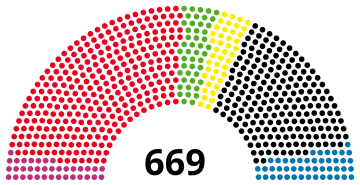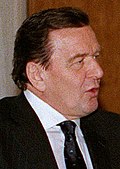
A | B | C | D | E | F | G | H | CH | I | J | K | L | M | N | O | P | Q | R | S | T | U | V | W | X | Y | Z | 0 | 1 | 2 | 3 | 4 | 5 | 6 | 7 | 8 | 9
| |||||||||||||||||||||||||||||||||||||||||||||||||||||||||||||||||||||||||||
All 669 seats in the Bundestag 335 seats needed for a majority | |||||||||||||||||||||||||||||||||||||||||||||||||||||||||||||||||||||||||||
|---|---|---|---|---|---|---|---|---|---|---|---|---|---|---|---|---|---|---|---|---|---|---|---|---|---|---|---|---|---|---|---|---|---|---|---|---|---|---|---|---|---|---|---|---|---|---|---|---|---|---|---|---|---|---|---|---|---|---|---|---|---|---|---|---|---|---|---|---|---|---|---|---|---|---|---|
| Registered | 60,762,751 | ||||||||||||||||||||||||||||||||||||||||||||||||||||||||||||||||||||||||||
| Turnout | 49,947,087 (82.2%) | ||||||||||||||||||||||||||||||||||||||||||||||||||||||||||||||||||||||||||
| |||||||||||||||||||||||||||||||||||||||||||||||||||||||||||||||||||||||||||
 The left side shows constituency winners of the election by their party colours. The right side shows party list winners of the election for the additional members by their party colours. | |||||||||||||||||||||||||||||||||||||||||||||||||||||||||||||||||||||||||||
| |||||||||||||||||||||||||||||||||||||||||||||||||||||||||||||||||||||||||||
| This article is part of a series on the |
| Politics of Germany |
|---|
 |
Federal elections were held in Germany on 27 September 1998 to elect the members of the 14th Bundestag. The Social Democratic Party (SPD) emerged as the largest faction in parliament for the first time since 1972, with its leader Gerhard Schröder becoming chancellor. The Christian Democrats had their worst election result since 1949.[1]
Issues and campaign
Since German reunification on 3 October 1990, the unemployment rate in Germany had risen from 4.2% to 9.4% in 1998, with the Federal Labor Office registering more than 4 million unemployed. The unified Germany had to fight economic and domestic difficulties even as it actively participated in the project of European integration. Most people blamed the centre-right coalition government of the Christian Democratic Union/Christian Social Union (CDU/CSU) and the Free Democratic Party (FDP) for the economic difficulties. Longtime Chancellor Helmut Kohl's government was regarded by many as not having fully implemented the unification after eight years, in view of the mass protests in many eastern German towns due to job losses and social welfare cuts.
The 1998 campaign began with both the CDU and SPD working out who would lead their parties. There had been rumours that Kohl would resign and allow Wolfgang Schäuble to take the reins of the CDU, but these rumours were rendered obsolete when Kohl announced in April 1997 that he would seek the chancellorship for a sixth term. The two contenders for the SPD nomination were Oskar Lafontaine, the party's chairman, and Gerhard Schröder, Minister-President of Lower Saxony.
On 1 March 1998, Schröder led the SPD to a huge victory in the Lower Saxony state election, gaining an unusual absolute majority for the second time and effectively receiving the SPD nomination for federal chancellor. Schröder had announced he would withdraw his bid for the nomination if he received below 42 percent of the popular vote. In the 1998 general elections, Schröder received 47.9 percent.[2] Following this election, Lafontaine withdrew his bid and Schröder was inaugurated in the May 1998 convention. For the SPD, Schröder offered a new face for the party. He gave the party a new vigor, one that was lacking in the CDU after Kohl proclaimed his nomination. Many in the CDU questioned if Kohl had made the right choice for the party.
The CDU campaign was based on the experience and reputation of Kohl. One of the CDU's main slogans was 'Safety, not Risks.' "Kohl exploited his familiarity and experience, as well as his status as Europe's longest serving head of government."[2] The SPD on the other hand ran the campaign using strategies developed in the United States and the United Kingdom. The SPD set up election headquarters and introduced 'rapid rebuttal units' not unlike those used by Bill Clinton of the United States in his successful presidential bid in 1992.[3] The SPD avoided direct attacks at Kohl, but rather focused on their message of a "new center".[3]
The FDP had usually ridden on the coattails of the CDU, and was mostly disapproved in the polls. With the SPD well ahead in the polls, many of the voters from the CDU had fewer incentives to vote for the FDP. The FDP was also having trouble projecting a coherent platform to voters. The Greens too were having issues concerning their platform.
The two factions in the Greens, the fundamentalists and the pragmatists, had problems settling on their platform since the founding of the Green party.
The major issue of the 1998 campaign was unemployment. In 1996, the unemployment rate in Germany surpassed the government's "limit" of 4 million unemployed people. Both parties blamed high labor costs, high taxes and the high welfare costs as the causes of the problem. During the campaign, Schröder used this issue against Kohl, calling him 'the unemployment chancellor.' Unemployment was worst in the former East Germany. While the national rate stood at 9.4 percent, former East Germany was suffering with unemployment at 20 percent. Many in the former East Germany blamed Kohl for the slow economic recovery.
Another issue at hand were Germany's tax and welfare reforms. While the CDU/CSU had offered proposals to reduce benefits in healthcare and pensions, the SPD controlled Bundesrat secured the passage of the bill. The proposed bill also offered tax cuts that were to benefit the rich, something the SPD opposed. While Kohl continually pushed the issue of European integration, the issue fell short from voters' minds. Schröder, on the other hand, almost ignored the issue. Many voters in Germany had other concerns besides the European Union.
Opinion polls

Results
 | |||||||||
|---|---|---|---|---|---|---|---|---|---|
| Party | Party-list | Constituency | Total seats | +/– | |||||
| Votes | % | Seats | Votes | % | Seats | ||||
| Social Democratic Party | 20,181,269 | 40.93 | 86 | 21,535,893 | 43.80 | 212 | 298 | +46 | |
| Christian Democratic Union | 14,004,908 | 28.40 | 124 | 15,854,215 | 32.25 | 74 | 198 | −46 | |
| Christian Social Union | 3,324,480 | 6.74 | 9 | 3,602,472 | 7.33 | 38 | 47 | −3 | |
| Alliance 90/The Greens | 3,301,624 | 6.70 | 47 | 2,448,162 | 4.98 | 0 | 47 | −2 | |
| Free Democratic Party | 3,080,955 | 6.25 | 43 | 1,486,433 | 3.02 | 0 | 43 | −4 | |
| Party of Democratic Socialism | 2,515,454 | 5.10 | 32 | 2,416,781 | 4.92 | 4 | 36 | +6 | |
| The Republicans | 906,383 | 1.84 | 0 | 1,115,664 | 2.27 | 0 | 0 | 0 | |
| German People's Union | 601,192 | 1.22 | 0 | 0 | New | ||||
| Initiative Pro D-Mark | 430,099 | 0.87 | 0 | 0 | New | ||||
| The Grays – Gray Panthers | 152,557 | 0.31 | 0 | 141,763 | 0.29 | 0 | 0 | 0 | |
| Human Environment Animal Protection | 133,832 | 0.27 | 0 | 1,734 | 0.00 | 0 | 0 | 0 | |
| National Democratic Party | 126,571 | 0.26 | 0 | 45,043 | 0.09 | 0 | 0 | 0 | |
| Federation of Free Citizens – The Offensive | 121,196 | 0.25 | 0 | 134,795 | 0.27 | 0 | 0 | New | |
| Ecological Democratic Party | 98,257 | 0.20 | 0 | 145,308 | 0.30 | 0 | 0 | 0 | |
| Party of Bible-abiding Christians | 71,941 | 0.15 | 0 | 46,379 | 0.09 | 0 | 0 | 0 | |
| Anarchist Pogo Party | 35,242 | 0.07 | 0 | 1,676 | 0.00 | 0 | 0 | New | |
| Natural Law Party | 30,619 | 0.06 | 0 | 35,132 | 0.07 | 0 | 0 | 0 | |
| Feminist Party | 30,094 | 0.06 | 0 | 3,966 | 0.01 | 0 | 0 | New | |
| Chance 2000 | 28,566 | 0.06 | 0 | 3,206 | 0.01 | 0 | 0 | New | |
| Bavaria Party | 28,107 | 0.06 | 0 | 1,772 | 0.00 | 0 | 0 | 0 | |
| Family Party | 24,825 | 0.05 | 0 | 8,134 | 0.02 | 0 | 0 | 0 | |
| Christian Centre | 23,619 | 0.05 | 0 | 9,023 | 0.02 | 0 | 0 | 0 | |
| Bürgerrechtsbewegung Solidarität | 9,662 | 0.02 | 0 | 10,260 | 0.02 | 0 | 0 | 0 | |
| Party of the Non-voters | 6,827 | 0.01 | 0 | 0 | New | ||||
| Car-drivers' and Citizens' Interests Party | 6,759 | 0.01 | 0 | 1,458 | 0.00 | 0 | 0 | 0 | |
| Party for Social Equality | 6,226 | 0.01 | 0 | 0 | 0 | ||||
| Alliance for Germany | 6,196 | 0.01 | 0 | 1,946 | 0.00 | 0 | 0 | New | |
| Party of the Willing to Work and Socially Vulnerable | 5,556 | 0.01 | 0 | 10,449 | 0.02 | 0 | 0 | 0 | |
| Marxist–Leninist Party | 4,731 | 0.01 | 0 | 7,208 | 0.01 | 0 | 0 | 0 | |
| New Forum | 4,543 | 0.01 | 0 | 6,296 | 0.01 | 0 | 0 | New | |
| Alternative Citizens' Movement 2000 | 3,355 | 0.01 | 0 | 4,097 | 0.01 | 0 | 0 | New | |
| Democratic Party | 2,432 | 0.00 | 0 | 1,172 | 0.00 | 0 | 0 | New | |
| Humanist Party | 435 | 0.00 | 0 | 532 | 0.00 | 0 | 0 | 0 | |
| German Social Union | 8,180 | 0.02 | 0 | 0 | 0 | ||||
| Statt Party | 4,406 | 0.01 | 0 | 0 | 0 | ||||
| German Communist Party | 2,105 | 0.00 | 0 | 0 | 0 | ||||
| Centre Party | 2,076 | 0.00 | 0 | 0 | 0 | ||||
| Middle Class Party | 1,924 | 0.00 | 0 | 0 | New | ||||
| Free Social Union | 763 | 0.00 | 0 | 0 | 0 | ||||
| Freedom Party | 131 | 0.00 | 0 | 0 | New | ||||
| Independents and voter groups | 66,026 | 0.13 | 0 | 0 | 0 | ||||
| Total | 49,308,512 | 100.00 | 341 | 49,166,580 | 100.00 | 328 | 669 | −3 | |
| Valid votes | 49,308,512 | 98.72 | 49,166,580 | 98.44 | |||||
| Invalid/blank votes | 638,575 | 1.28 | 780,507 | 1.56 | |||||
| Total votes | 49,947,087 | 100.00 | 49,947,087 | 100.00 | |||||
| Registered voters/turnout | 60,762,751 | 82.20 | 60,762,751 | 82.20 | |||||
| Source: Bundeswahlleiter | |||||||||
Results by state
Second vote (Zweitstimme, or votes for party list)





